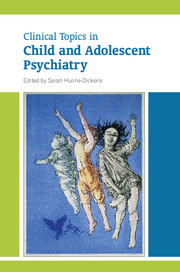Book contents
- Frontmatter
- Contents
- List of tables
- List of boxes
- List of figures
- List of contributors
- Preface
- 1 Child psychiatry and the people who have shaped it
- 2 Fabrication and induction of illness in children
- 3 Personality disorders as disorganisation of attachment and affect regulation
- 4 Post-traumatic stress disorder and attachment: possible links with borderline personality disorder
- 5 Management of antisocial behaviour in childhood
- 6 Pharmacology for attention-deficit hyperactivity disorder, Tourette syndrome and autism spectrum disorder
- 7 Pharmacology for anxiety and obsessive–compulsive disorders, affective disorders and schizophrenia
- 8 Pharmacological management of core and comorbid symptoms in autism spectrum disorder
- 9 Pharmacological treatment of depression and bipolar disorder
- 10 Cognitive–behavioural therapy with children, young people and families: from individual to systemic therapy
- 11 Anxiety disorders
- 12 Somatising: clinical presentations and aetiological factors
- 13 Somatising: management and outcomes
- 14 Evaluating psychological treatments for children with autism
- 15 Attention-deficit hyperactivity disorder: assessment and treatment
- 16 Schizophrenia
- 17 Tourette syndrome
- 18 Sleep disorders
- 19 Self-harm in adolescents
- 20 Adolescent substance misuse: an update on behaviours and treatments
- 21 Eating disorders
- 22 Gender dysphoria in young people
- 23 The psychiatry of children aged 0–4
- Index
14 - Evaluating psychological treatments for children with autism
Published online by Cambridge University Press: 02 January 2018
- Frontmatter
- Contents
- List of tables
- List of boxes
- List of figures
- List of contributors
- Preface
- 1 Child psychiatry and the people who have shaped it
- 2 Fabrication and induction of illness in children
- 3 Personality disorders as disorganisation of attachment and affect regulation
- 4 Post-traumatic stress disorder and attachment: possible links with borderline personality disorder
- 5 Management of antisocial behaviour in childhood
- 6 Pharmacology for attention-deficit hyperactivity disorder, Tourette syndrome and autism spectrum disorder
- 7 Pharmacology for anxiety and obsessive–compulsive disorders, affective disorders and schizophrenia
- 8 Pharmacological management of core and comorbid symptoms in autism spectrum disorder
- 9 Pharmacological treatment of depression and bipolar disorder
- 10 Cognitive–behavioural therapy with children, young people and families: from individual to systemic therapy
- 11 Anxiety disorders
- 12 Somatising: clinical presentations and aetiological factors
- 13 Somatising: management and outcomes
- 14 Evaluating psychological treatments for children with autism
- 15 Attention-deficit hyperactivity disorder: assessment and treatment
- 16 Schizophrenia
- 17 Tourette syndrome
- 18 Sleep disorders
- 19 Self-harm in adolescents
- 20 Adolescent substance misuse: an update on behaviours and treatments
- 21 Eating disorders
- 22 Gender dysphoria in young people
- 23 The psychiatry of children aged 0–4
- Index
Summary
Once considered to be a very rare condition, diagnosed mainly in children with severe intellectual impairments and no or very limited language, it is now known that autism can occur in individuals of all cognitive and linguistic levels and that its effects are lifelong. Awareness of this wider spectrum has resulted in a steady decrease in age at first diagnosis (Fountain et al, 2011) and an increase in prevalence estimates from approximately 4 per 10 000 in the 1970s to around 1 per 100 (Baird et al, 2006). These changes have resulted in much greater research into the effectiveness of different interventions and there has been a particular focus on developing programmes for newly diagnosed preschool children. The present chapter focuses on current evidence for the effectiveness of psychosocial interventions, but further information on a wide range of other interventions can be found at the Research Autism website (www. researchautism.net). The aim of this website, which is associated with the UK National Autistic Society, is to review the published evidence on interventions in popular use. Over 100 interventions are currently listed, and the quality of evidence (both favourable and unfavourable) is rated by independent experts. The website covers developmental, educational, psychological, pharmacological and ‘alternative’ or ‘complimentary’ therapies (e.g. pet therapies, special diets and vitamin supplements, and some potentially hazardous interventions such as chelation, testosterone regulation and hyperbaric oxygen).
Interventions for children with autism
There are a number of psychologically based interventions for which the evidence base is improving. These include interventions designed to enhance cognitive and behavioural functioning, and those that focus on the specific deficits associated with autism, particularly in the areas of communication and social skills.
Behavioural interventions
The effectiveness of behaviourally based strategies for children with autism was initially demonstrated in the 1960s, although the focus then was predominantly on the elimination of ‘undesirable’ behaviours, notably tantrums, aggression and self-injury, with frequent use of aversive procedures, including electric shock.
Throughout the 1970s, treatment was largely conducted on an in-patient hospital basis, often with very little involvement of the child's family. The procedures used to improve skills such as social interaction and communication were frequently highly prescriptive and inflexible, and took little account of individual factors such as the child's developmental level or the family situation.
- Type
- Chapter
- Information
- Clinical Topics in Child and Adolescent Psychiatry , pp. 218 - 230Publisher: Royal College of PsychiatristsPrint publication year: 2014



